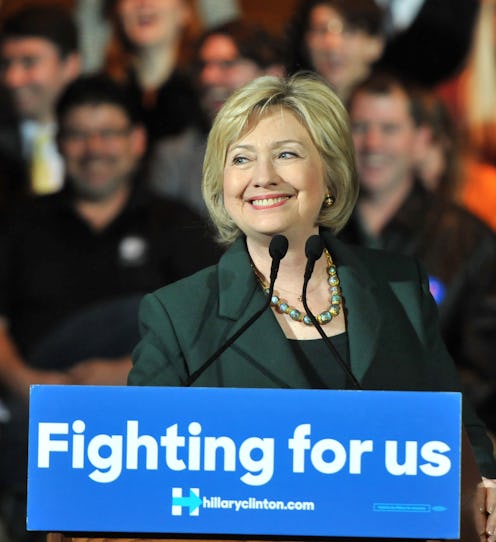News
2016 Won't Be A 2008 Repeat For Clinton
Remember that time a guy named Barack Obama virtually came out of nowhere and beat Hillary Clinton in the 2008 Democratic primary election? Yeah, so do a lot of other people. This time around it's a different senator who could overtake Clinton for the Democratic nomination, but the comparisons between 2008 and 2016 seem too easy to make. Even before Saturday night's Democratic debate, the 2008/2016 comparisons had been pouring in — but there's at least one reason why 2016 won't be a repeat of 2008, and Saturday's debate focused right on it.
As analysts, journalists, and probably your skeptical next-door neighbor have pointed out by now, Clinton went into the 2008 primaries with a solid lead in the polls, particularly at the respective point in the race that we're experiencing now. She's heading into the new year with another solid lead this time around. At the time of Saturday's debate, Clinton had roughly 55 percent of the Democratic primary vote, according to Real Clear Politics. She leads Sen. Bernie Sanders, 2016's would-be Obama, by more than 25 percentage points and third-place Martin O'Malley by more than 50 percentage points. ABC News, which hosted Saturday's debate, even mentioned Clinton's lead and the 2008 comparison ahead of the weekend-night duel. According to ABC's numbers, Clinton had an even bigger lead over Sanders going into the debate and an eerily similar lead over Obama in 2007.
It's true that Obama and Sanders can be compared for several reasons, including their poll numbers. They both ran for president as senators, they both appeal largely to young voters, and they both have employed catchy slogans and campaign graphics (although you'd pretty much have to be foolish not to come up with a good slogan and logo as a presidential candidate nowadays). Still, though, Saturday's debate, as well as the GOP debate that occurred earlier in the week, show that there's something particularly important that the American people are focused on right now that could sway the vote further in Clinton's favor — potentially turning all of those 2008 comparisons into a moot point.
In two words, the difference between 2008 and 2016 is national security. In 2008, Americans increasingly wanted to see U.S. troops brought home from Iraq after years of war had made people weary. In fact, public support for pulling troops out of Iraq peaked in June 2007 (not long before the 2008 primaries), when 56 percent of Americans wanted troops removed. Comparatively, we're still talking about Iraq and the possibility of a long ground war now, but the outlook of the American people is much different. Just a few weeks ago, CNN released a poll that for the first time showed that a majority of Americans support the use of ground troops to fight ISIS.
From around the time Obama first ran for president in 2008 until a few weeks ago, a great way to win public support was to say that you would bring American soldiers home. Now, it's not necessarily that Americans want to send soldiers into a long ground war, but rather, many Americans aren't satisfied with the way that the current administration is dealing with ISIS, and they see ground troops as a necessary offensive. That poses a direct challenge to all of the Democratic candidates, who are unified in saying that they don't support the use of ground troops in Iraq or Syria.
In addition to CNN's poll, the evidence that Americans are focused steadfastly on national security is hard to ignore. Debates over military strategy, gun rights, and immigration have exploded over the last few weeks, following startling terrorist attacks in Paris and San Bernardino, California. In the past week, both Republicans and Democrats have taken to the debate stage to make their case for the presidency, and both debates have focused largely, if not solely, on national security. The fifth Republican debate on Tuesday evaluated each candidate's approach to ISIS, gun control, and immigration, while Saturday's third Democratic debate devoted about half of its time to national security and these related issues.
When it comes to national security, it's hard to see a candidate like Sanders overthrowing Clinton's lead. Clinton has previously served as secretary of state, and she has been heavily involved with the United Nations. Sanders, on the other hand, is a senator from Vermont who has become known for his liberal platform that focuses on domestic issues, like the economy, women's rights, and health care. That's not to say that Sanders can't lead on issues of national security or foreign policy, but it is to say that Clinton has a serious foreign policy resume, one that might even negate all of the scandals she's been involved in lately. Even during Saturday's Democratic debate, ABC News found that Clinton has a clear majority of support when it comes to national security:
Ultimately, the comparison between Obama and Sanders has definitely not gone unnoticed — and it shouldn't. It's an important reminder that Sanders can't be counted out, yet. But with so much on the line in terms of national security, it seems highly unlikely that either trailing Democratic candidate will be able to pull off an upset like Obama did in 2008.
